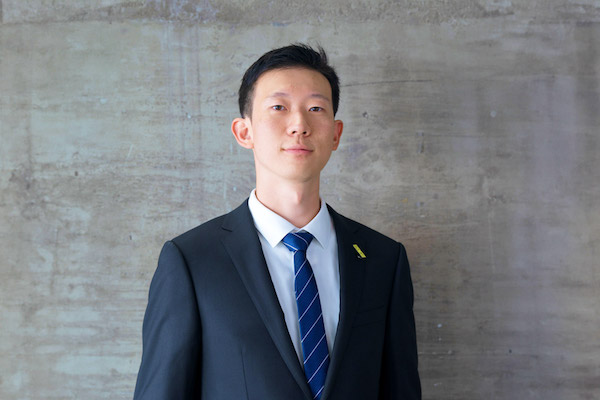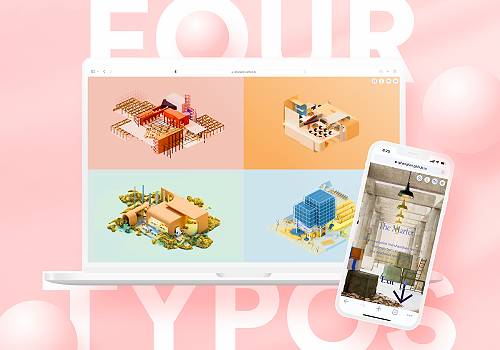
Qihang Fan
1. Please give us a brief bio of yourself and your background.
Hi, my name is Qihang Fan. I stand out as an award-winning multidisciplinary designer, independent developer, and product owner, dedicated to crafting experiences that embody inclusiveness, enjoyment, and innovation. I seamlessly integrate avant-garde technology into everyday life for the next million users.
With a solid foundation in architectural design, I have honed an astute appreciation for user experience and the dynamics of spatial interaction. My passion for technological advancement has provided me with an extensive software repertoire, ranging from graphic design to 3D production, along with expertise in programming languages such as JavaScript, C#, and Python. Presently, I'm pioneering the use of augmented reality to revolutionize surgical procedures.
2. What made you become/why did you choose to become a product designer?
I chose to become a product designer because I have always been fascinated by the rapid evolution of technology and its potential to significantly improve our quality of life. However, many people find it challenging to harness the benefits of the latest advancements, such as AI and XR. As a designer, especially in the field of product design, I see it as my responsibility to lower these barriers, making technology more accessible and user-friendly.
My approach involves using my understanding of technology to curate intuitive human-computer interactions that can scale to support the next million users. I am passionate about using inclusive design principles to ensure that our technological advances benefit a broad audience. This commitment not only enhances usability and engagement but also has a profound impact on creating better lives through more inclusive, effective tools. This focus on making technology work for people, not the other way around, drives my career and my daily efforts as a product designer.
3. Tell us more about your business/company, job profile, and what you do.
As an independent developer, I established my brand with a clear and persistent mission: to create products that simplify the complex. My overarching goal has always been to make advanced technology easy to understand and enjoyable for everyone. A prime example of my work is a website I developed that offers interactive web-based 3D experiences. This platform allows users to deeply engage with intricate architectural and fashion design concepts, providing immersive 3D experiences even for those who lack access to XR devices.
Currently, I am a user experience designer and product engineer at Arthrex, where I focus on using augmented reality to enhance surgical procedures. My role involves exploring how augmented reality can revolutionize these processes, combining my expertise in user experience design with ground-breaking product engineering. This work is gratifying because it allows surgeons to perform their operations with greater precision and safety. My passion for innovation has been a driving force in my career, motivating me to deliver impactful and user-friendly solutions, whether working for an employer or running my own business. This lifelong commitment to exploring and implementing emerging technologies underpins all of my professional endeavors.
4. What does “design” mean to you?
For me, design is all about communication and sharing. It's a creative process through which I can turn the knowledge and insights I gather into real, tangible products. This process transforms complex ideas into formats that are not only accessible but also engaging, helping individuals effortlessly gain knowledge and information through their interactions with design. Whether it involves creating a digital interface, a physical product, or an immersive environment, every design takes users on a journey towards deeper understanding and appreciation.
My goal in crafting these journeys is to ensure that interactions are smooth and intuitive, allowing learning to occur naturally as an integral part of the user experience. Thus, design acts as a crucial link between human experience and technological innovation, embedding learning into the fabric of everyday life in a way that is both meaningful and enjoyable.
5. What’s your favorite kind of design and why?
My favorite kind of design incorporates elements of entertainment and gamification. I am particularly drawn to designs that engage users not just on a functional or aesthetic level but through an experience that is fun and interactive. The impact of entertaining and gamified design is profound. It transforms everyday tasks into more enjoyable and compelling activities, thereby increasing user engagement and retention.
This kind of design not only captivates but also connects with users on an emotional level, making experiences memorable. By leveraging the principles of game design, I can create user experiences that are not only purposeful but also deeply immersive. Such designs encourage continuous interaction and exploration, significantly enhancing user involvement and satisfaction.
6. To you, what makes a “good” design?
For me, a good design represents the perfect balance between creativity and practicality. Creativity is the engine that drives innovation, pushing the boundaries of traditional perspectives and encouraging us to explore new possibilities. It brings a fresh approach to problem-solving, often leading to groundbreaking ways of interaction and functionality that can transform user experiences.
On the other hand, practicality is what ensures that these creative ideas are not just concepts. It grounds them in reality, making sure they are feasible, accessible, and aligned with user needs. Good design transcends aesthetics. It is about creating meaningful interactions that enhance everyday life.
7. Describe your design style and its main characteristics.
My design style is characterized by a commitment to rapid iteration and continuous improvement. I strongly believe in the power of prototyping and usability testing to refine and enhance my designs. This approach allows me to quickly create initial prototypes and then gather feedback directly from users, as well as fellow designers and engineers. By incorporating this feedback early and often, I ensure that my designs are both innovative and user-centric.
This iterative method is not only about speed but also about precision and adaptability. It allows me to respond dynamically to user needs and technological advances, making adjustments that are informed by real-world interactions and technical insights. Key features of my design style include a strong focus on functionality, accessibility, and user engagement, ensuring that each design is optimized for the best possible user experience.
8. Tell us about your design process.
In my role as a user experience designer and product engineer within an R&D team, my design process is centered on a careful examination and balancing act between design and development. This approach is essential to ensure the feasibility of designs before they go into production.
I constantly evaluate both the aesthetic and functional aspects of a design, aligning them with the practical constraints and capabilities of current technology. This iterative process involves frequent adjustments and refinements to align the creative vision with technical realities, ensuring that the end product is not only innovative but also practical and executable.
9. Congratulations! As the winner of the 2024 NY Product Design Awards, what does it mean to you and your company and team to receive this award distinction?
Receiving the 2024 NY Product Design Awards is an incredibly meaningful honor for me as an independent developer. It goes beyond recognizing the effort and dedication I've invested in my projects. This distinction highlights my website and the innovative endeavors I've pursued, significantly boosting my reputation in the industry.
In addition, it enhances my branding, elevates my visibility, and establishes my credibility as a designer. Most importantly, this award draws attention to the vital role of inclusive design. It emphasizes the importance of designing for all users and creating products that are accessible and enjoyable for people with diverse abilities. This accolade drives me to continue innovating and making design choices that foster a more inclusive environment for everyone.
10. Can you explain a bit about the winning work you entered into the 2024 NY Product Design Awards, and why you chose to enter this project?
Traditional 2D diagrams and renderings often fail to capture the richness of fashion concepts and architectural experiences. To remedy this, web-based interactive digital media has been introduced to enhance the immersive user experience. Four Typologies is a responsive interactive media website that introduces new decentralized and localized Garden Fashion Factory Typologies evoking humanity and resisting industrial mechanization trends.
The design allows users to explore architectural designs from a macro perspective, appreciating intricate miniatures, to a micro level where they can engage with nuanced interactions and dynamic textures. It immerses users in a nonlinear workflow of upcycling handicrafts tailored to each architectural miniature, making architectural designs and fashion concepts more tangible, interactive, and accessible to a wider audience.
11. Where do you see the evolution of design industry going over the next 5-10 years?
One of the most significant changes we will see in the design industry is the acceleration of design processes, thanks to artificial intelligence. AI tools are becoming increasingly sophisticated at handling repetitive and time-consuming tasks, which frees designers to focus on more creative and strategic aspects of their projects. This not only speeds up the production cycle but also enhances the quality of the design by allowing more time for refinement and iteration.
Looking ahead, the design industry will likely see even greater integration with other disciplines, such as psychology, neuroscience, and environmental science. AI can facilitate this cross-disciplinary approach by helping synthesize and apply complex cross-cutting insights into the design process. This will enable designers to create more effective and sustainable solutions that address both the immediate needs of users and broader societal challenges.
12. If you were a student entering this industry or an aspiring NY Product Design Awards submitter, what advice would you give them?
It is essential to cultivate your passion for design. Passion is the driving force that will keep you motivated through challenges and setbacks. Let your passion for creating and innovating lead the way. This passion not only fuels your creativity but also inspires those around you, making your work resonate more deeply with others. Always remember why you started designing in the first place, and let that initial spark guide your journey.

